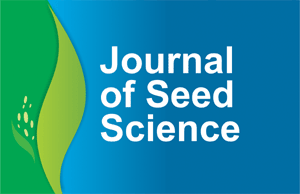ABSTRACT:
The tetrazolium test quickly assesses seed viability, the efficiency of which depends on methodological adjustments for each species. Therefore, the objective was to evaluate the viability of Anadenanthera colubrina seeds using this test. The seeds were aged for 12 h and 24 h to obtain differences in physiological quality. Initial quality was assessed by the following tests: germination, emergence, GSI and ESI, and MGT and MET. For the tetrazolium test, a completely randomized experimental design was used in a 3 × 9 factorial arrangement consisting of three accelerated aging (AA) conditions (0, 12, and 24 h of AA) and nine combinations between concentrations of tetrazolium salt and immersion time in this salt (0.075% / 4 h, 0.075% / 6h, 0.075% / 8h, 0.1% / 4 h, 0.1% / 6 h, 0.1% / 8 h, 0.5% / 4 h, 0.5% / 6 h, and 0.5% / 8 h), with four replications of 25 seeds, evaluated at temperatures of 35 °C and 40 °C. The seeds were classified as viable and vigorous, viable and not vigorous, and inviable. The tetrazolium test was effective for estimating the viability of A. colubrina seeds. To make this estimation, the seeds should be chipped in the region opposite the micropyle, then pre-moistened in water for 10 h, followed by removal of the seed coat and immersion in a 0.1% tetrazolium solution for 4 h at 35 °C. Under these conditions, the tetrazolium test successfully identified differences in the physiological quality of unaged seeds and seeds aged for 12 h and 24 h.
Index terms:
angico; seeds; viability; vigor

 Thumbnail
Thumbnail
 Thumbnail
Thumbnail
 Thumbnail
Thumbnail
 Thumbnail
Thumbnail



